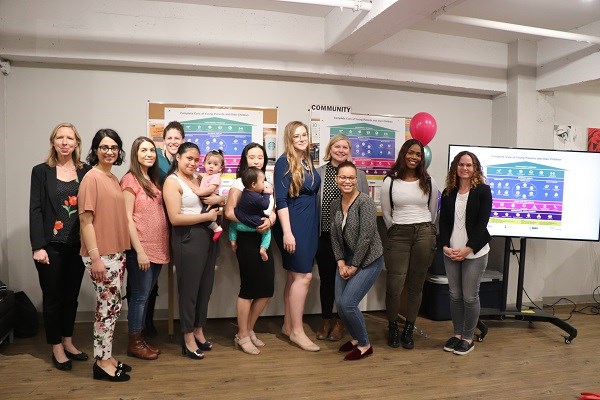New resource aims to help bridge the gap between clinicians and teen parents
Summary:
Go behind the scenes with the clinical team and young mothers responsible for creating the “Complete Care of Young Parents and their Children” infographic, a joint effort between SickKids, Young Parents No Fixed Address (YPNFA), Toronto Public Health, and the University of Toronto.
By Maia Leggott, Communications and Public Affairs
Navigating the health-care system can be a challenge for many people, regardless of age. For adolescents who become pregnant, this challenge intensifies as they face stigma and uncertainty in dealing with a completely unfamiliar situation.
That’s why clinicians from The Hospital for Sick Children (SickKids), Young Parents No Fixed Address (YPNFA), Toronto Public Health (TPH) and the University of Toronto (U of T) enlisted the participation of young mothers in developing a new clinical tool.
The “Complete Care of Young Parents and their Children” infographic (PDF) is aimed at helping clinicians better understand and empathize with the unique health-care needs of adolescent-led families.
Jill, 18, and Vanessa, 19, understand from first-hand experience what it’s like to navigate a system that can be judgmental and, as a result, dismissive of their concerns as pregnant and parenting adolescents.
“It’s really amazing that I can use my experience to help others, and I hope that hearing my story gives them something to relate to,” Jill said. She wanted to share the positives and negatives about her own experience, in hopes that it would encourage other young women to feel comfortable seeking health care.
"It can take a lot for an adolescent to work up the courage to seek help for pregnancy, and I know this from personal experience,” said Dr. Simone Lebeuf, Adolescent Medicine Fellow at SickKids, and Research Lead on the project. “When met with a condescending attitude, they don’t feel encouraged to continue engaging in health care, so that’s how we decided to start this project.”
The project team found that youth who are pregnant typically have limited engagement with the health-care system due to stigma. They’re more likely to visit a walk-in clinic for acute issues, or not visit a clinic at all, than visit a consistent primary care provider in fear of being judged or dismissed. Clinicians from SickKids, YPNFA, TPH and U of T saw an opportunity to work toward elevating the standard of care for this population.
Nurse Practitioner Gillian Thompson leads the Young Families Program at SickKids and is the community partner liaison on the infographic project. “We wanted to create a clinical tool that promotes responsive, respectful care between health-care providers and their patients,” she said. “The lived experience of our patient consultants was vital to creating a final product that is accessible, thoughtful, and can assist clinicians in providing well-rounded care to adolescent-led families.”

On May 21, 2019, the infographic officially launched with an event at Yonge Street Mission’s Evergreen Centre. Clinicians introduced the project, vision, and methods, and Jill and Vanessa were both there to share their experiences with the project.
“I wanted people to know how hard it can be for a pregnant teen to feel comfortable seeking proper health care,” Jill said. “The type of environment we’re looking for is not judgmental, and is empathetic, not just sympathetic towards our situation. This is our choice and we need to feel supported.”
Vanessa thinks the infographic will help health-care providers understand that young mothers want to create a safe, healthy, loving environment for their children. “The infographic is great because it touches on every potential need a teen mom might have in a way that’s easy for patients and their health-care providers to understand,” she said. It can be very hard to feel safe and supported when these needs aren’t met. “I lost some friends through this experience,” Vanessa added. “But I’m so grateful for the people who have supported me and listened to me, and for the providers I’ve found who treat me like a person in charge of my own body.”
A supportive community is essential for pregnant and parenting teens as they navigate their way through OB/GYN appointments, ultrasounds and blood tests. Jill and Vanessa both say they wish they had this resource when they were going through their own pregnancies.
“This resource is really going to help a lot of people; I’m happy to be a part of it,” Vanessa said. “This is for young parents to know we have a place in the health-care system and that’s really important.”
The infographic builds on the essential foundation of social stability and fills the space with other vital needs and services. Maternal, infant and child health are all laid out under a youth-friendly approach that supports the development of a well-rounded home. The reverse side of the document contains a resource guide for all the needs displayed in the infographic, so clinicians and patients in the Greater Toronto Area know where to reach out to address specific needs.
The team of clinicians and consultants on the project are hopeful that this resource will help many other patients and clinicians alike moving forward. As part of a pilot project, the infographic will be distributed to 40 health-care providers located in areas with high numbers of adolescent-led families and their responses to the infographic evaluated. A look at its impact on quality of care will later help determine the future distribution strategy.
“We’ve received really positive feedback on the tool,” said Dr. Ashley Vandermorris, Staff Paediatrician with the Young Families Program at SickKids and Principal Investigator for the project. “That is due in large part to the invaluable contributions by our young mothers. We are eager to share this resource more broadly so this new standard of care can be brought to more adolescent-led families like theirs.”
This work was funded by the Women’s Xchange $15K Challenge. View the infographic (PDF).

